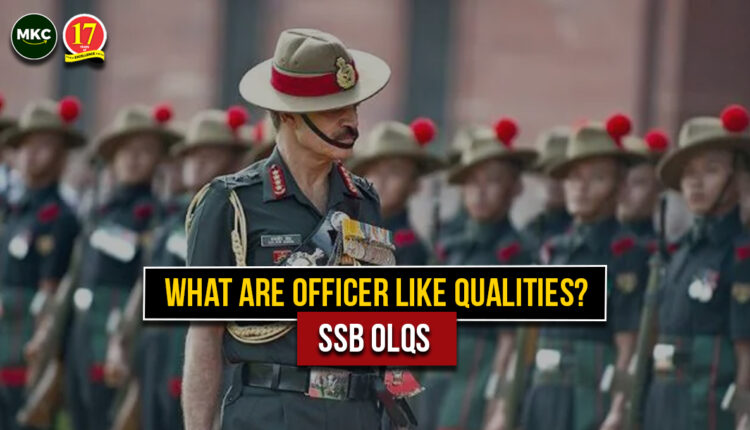What are Officer Like Qualities? | SSB OLQs
The 15 Officer-Like Qualities (OLQs) are traits assessed in candidates during Service Selection Board (SSB) interviews. These qualities are crucial for candidates aspiring to become officers in the Indian Armed Forces. The OLQs are integral in determining whether a candidate is suitable for leadership roles within the military. Understanding these qualities is essential for those aiming to succeed in the SSB and pursue a career as an officer.

The 15 Officer-Like Qualities (15 OLQs) are crucial in the Service Selection Board (SSB) Interview process. Conducted to evaluate candidates for officer positions in the Indian Armed Forces, the SSB interview assesses individuals’ suitability for leadership roles using these OLQs as a framework.
Many candidates approach their SSB interviews without adequate preparation, lacking awareness of the Officer-Like Qualities (OLQs) crucial for success. This lack of understanding hampers even potentially qualified candidates’ performance during the interview. In this article, we delve into the details of the 15 OLQs and the four major factors that determine a candidate’s selection, providing essential insights for SSB interview success.
Officer Like Qualities (15 OLQs)
Table of Contents
FACTOR – I ( Planning and Organising )
- Effective Intelligence
- Reasoning Ability
- Organising Ability
- Power of Expression
FACTOR – II ( Social Adjustment )
- Social Adaptability
- Co-Operation
- Sense of Responsibility
FACTOR – III ( Social Effectiveness )
- Initiative
- Self Confidence
- Speed of Decision
- Ability to Influence the Group
- Liveliness
FACTOR – IV ( Dynamic )
- Determination
- Courage
- Stamina
Also Read : 15 OLQ’s Required To Clear SSB Interview | Officer Like Qualities
What are 15 OLQs Required in SSB Interview
1. Effective Intelligence
Effective intelligence involves the ability to tackle practical situations of varying complexity. It differs from basic intelligence, which pertains to the capacity for perceiving relations or engaging in abstract thinking. Basic intelligence is typically evaluated through intelligence tests, whether verbal or non-verbal. Effective intelligence encompasses the following aspects:
(a) Practical intelligence: This involves the capacity to devise independent solutions for practical problems and situations.
(b) Resourcefulness: This entails the ability to utilize available resources creatively to achieve desired outcomes, especially when faced with challenging circumstances.
Generally, individuals with higher effective intelligence are considered bright, mentally sharp, penetrating, innovative, and inventive.
2. Reasoning Ability
Reasoning ability encompasses the capacity to grasp essentials thoroughly and reach conclusions through rational and logical thinking. It involves several components:
(a) Receptivity: This involves the ability to understand and absorb new impressions, driven by interest, attention, and grasping power.
(b) Inquiring attitude: It reflects a healthy curiosity leading to a desire to expand one’s general knowledge and life experiences.
(c) Logical reasoning: The ability to arrive at conclusions or judgments solely through rational thinking, while excluding emotional factors.
(d) Seeing essentials of a problem: This ability enables individuals not only to have a clear understanding of the situation at hand but also to analyze various factors, prioritize them, and effectively utilize them to find solutions.
Students with higher reasoning ability are exceptionally sharp, analytical, imaginative, logical, and practical.
3. Organising Ability
Organizational ability refers to the capacity to arrange resources systematically to achieve effective results. It involves optimizing available means to attain desired objectives.
Students with high organizational ability are meticulous planners, adept at handling complex issues without overlooking details. They demonstrate common sense, originality in actions, and quick comprehension.
4.Power of Expression
Communication skill is a fundamental aspect of personality assessment, evaluating one’s ability to convey ideas with ease and clarity. Students possessing strong communication skills are typically more eloquent, forceful, lucid, precise, and effective in their expression.
5. Social Adaptability
Adaptability in social settings is a vital aspect of an individual’s personality, encompassing their ability to acclimate to various social environments and interact effectively with different individuals and groups, including superiors, peers, and subordinates. Social adaptability comprises several components:
(a) Social Intelligence: This refers to the application of intelligence in social contexts, involving the ability to comprehend people and adapt smoothly to new surroundings.
(b) Attitude towards others: It involves the capacity to empathize with others’ perspectives, enabling one to understand their valid difficulties and offer assistance appropriately.
(c) Tact: Tactful management of others’ emotions and sensitivities is essential in navigating social interactions effectively.
(d) Adaptability: This entails the ability to adjust to different social environments. In the context of service, it also includes resilience, accommodation, and a genuine interest in service life.
Individuals with higher adaptability are typically affable, spontaneous in adjusting to new environments, outgoing, amiable, accommodating, flexible, understanding, friendly, and sympathetic.
6. Co-Operation
Cooperation reflects an individual’s willingness to actively engage with others in a group, working harmoniously towards shared goals. It signifies a belief in the productivity of collective effort over individual endeavors. Cooperation involves joint effort and a sense of team spirit, which entails prioritizing the group’s objectives above personal ones. Individuals who exhibit strong cooperation are often altruistic, selfless, and volunteer willingly, displaying a remarkable esprit de corps. They are also characterized by their warmth, spontaneity, and group-oriented mindset.
7. Sense of Responsibility
Responsibility enables an individual to be reliable and willingly fulfill their obligations. It encompasses a sense of duty but extends far beyond mere compliance. This entails:
(a) Sense of duty: Faithfully and resolutely executing assigned tasks.
(b) Discipline: Acting in strict accordance with rules, regulations, and conventions, fostering self-control and adherence to societal norms.
Sense of responsibility involves:
(a) A thorough comprehension of the importance of duty, societal norms, and individual obligations, followed by a voluntary commitment of one’s energy and attention.
(b) Doing one’s best, even when faced with unspecified or unforeseen duties, demonstrating a moral willingness to accept the consequences.
Individuals with a strong sense of responsibility are exceptionally dutiful, faithful, and respectful toward authority. They are highly conscientious and willingly shoulder their responsibilities.
8. Initiative
Initiative refers to the capacity to initiate purposeful action, comprising several elements:
(a) Ability to take the first steps in unfamiliar situations.
(b) Directing actions in the right direction.
(c) Sustaining effort until the goal is attained.
Individuals with strong initiative demonstrate originality in both thought and action. Those with a positive initiative mindset are not easily deterred; they are proactive, enterprising, persistent, and consistently generate fresh ideas.
9. Self Confidence
Self-confidence is the belief in one’s ability to navigate stressful situations, especially those that are unfamiliar. Individuals with high self-confidence remain composed, engage in rational thinking, have unwavering faith in their abilities, exhibit self-reliance, and approach difficulties with a constructive mindset.
10. Speed of Decision
Decision-making ability involves the capacity to reach practical decisions swiftly, considering factors such as:
(a) Appropriateness and cost-effectiveness.
(b) Feasibility and practicability.
(c) Promptness in decision-making.
Individuals with this skill are infallible, prompt, and judicious, making sound decisions with a sense of urgency. They do not waver, act impulsively, hesitate, or make erratic decisions.
11. Ability to Influence the Group
Leadership is the ability that empowers an individual to garner willing effort from a group to achieve desired objectives. This influence is instrumental in fostering cooperative and enthusiastic group efforts towards shared goals. Individuals with strong leadership qualities are highly inspiring, possessing a magnetic charm that makes them indispensable and impressionable. They are assertive, persuasive, firm, and demonstrate a considerable capacity to overcome opposition.
12. Liveliness
Resilience is the capacity of an individual to maintain a buoyant attitude when facing challenges and to create a cheerful atmosphere.
13. Determination
Perseverance is the sustained effort to achieve objectives despite facing obstacles and setbacks. It entails a steadfastness of purpose, mental focus, and strength of will. Perseverance includes:
(a) Application to work: The ability to apply oneself physically to tasks.
(b) Drive: The internal motivational force within an individual, empowering them to push forward despite pressure and urgency, towards achieving their goals. This drive may also inspire energetic action in others towards a common objective.
Individuals with strong perseverance are highly resolute, steadfast, determined, industrious, firm, steady, and persistent.
14. Courage
Courage is the ability to acknowledge and embrace purposeful risks willingly. It encompasses:
(a) The ability to confront perceived dangers.
(b) A spirit of adventure and enterprising mindset, with a willingness to dare or face hazards.
(c) The capacity to remain composed in adverse situations, enabling steady handling and navigation of such circumstances.
Individuals with courage are fearless risk-takers, daring, assertive, creative, bold, and resilient, displaying both physical and moral strength.
15. Stamina
The ability to endure prolonged physical and mental strain underscores resilience. Individuals with this trait exhibit Herculean physical and mental capabilities, capable of withstanding substantial physical and mental stress. They are indefatigable, composed, and exceptionally tough individuals.
Importance of 15 Officer Like Qualities
Officer-Like Qualities (OLQs) play a crucial role in identifying candidates with leadership potential, essential for officer positions. These OLQs evaluate various aspects:
- Leadership Potential: Assessing candidates’ ability to lead and inspire others.
- Decision-making Abilities: Evaluating candidates’ capacity to make prompt and sound decisions using effective intelligence and reasoning skills.
- Teamwork and Cooperation: Gauging candidates’ inclination and capability to collaborate effectively in teams.
- Responsibility and Integrity: Determining candidates’ commitment to upholding ethical standards and fulfilling their duties.
- Effective Communication: Assessing candidates’ proficiency in conveying ideas clearly and confidently.
- Initiative and Self-Confidence: Evaluating candidates’ willingness to take charge and exhibit proactive behavior.
- Physical and Mental Attributes: Assessing candidates’ physical and mental capabilities, including courage, stamina, and emotional stability.
- Adaptability and Flexibility: Evaluating candidates’ ability to adjust to changing circumstances and demonstrate flexibility.
- Positive Attitude: Gauging candidates’ ability to maintain optimism and resilience even in adverse situations.
Major Kalshi Classes (MKC) is renowned as India’s premier SSB Interview Coaching center. With a distinguished history spanning 17 years, MKC has assisted over 10,000 SSB aspirants in successfully cracking the SSB Interview and joining the esteemed Indian Armed Forces. At MKC, our focus lies in refining candidates’ Officer-Like Qualities (OLQs) and nurturing them to meet the standards required for the SSB Interview. Here are some key factors that highlight why MKC stands out as the best SSB Interview training institute:
- Expert Mentorship: Candidates receive personalized guidance from the best mentors for each task, along with individualized feedback and assessments.
- Comprehensive Infrastructure: MKC boasts the largest GTO Ground equipped with all outdoor GTO tasks to provide candidates with practical training.
- Speaking Skills Enhancement: Daily Group Discussion and Lecturette sessions are conducted to enhance candidates’ speaking abilities.
- Mock Interview Sessions: Multiple mock interview sessions are conducted by interviewing officers to prepare candidates for the actual interview process.
- Psychological Test Guidance: Candidates receive assistance with psychological tests and feedback from experts.
- Reasoning and Communication Skills Improvement: Daily sessions focusing on Officer Intelligence Rating (OIR) and Progressive Picture Perception and Description Test (PPDT) are held to enhance reasoning ability and communication skills.
At MKC, we are committed to providing comprehensive and effective training to help candidates excel in the SSB Interview and fulfill their aspirations of serving in the Indian Armed Forces.









